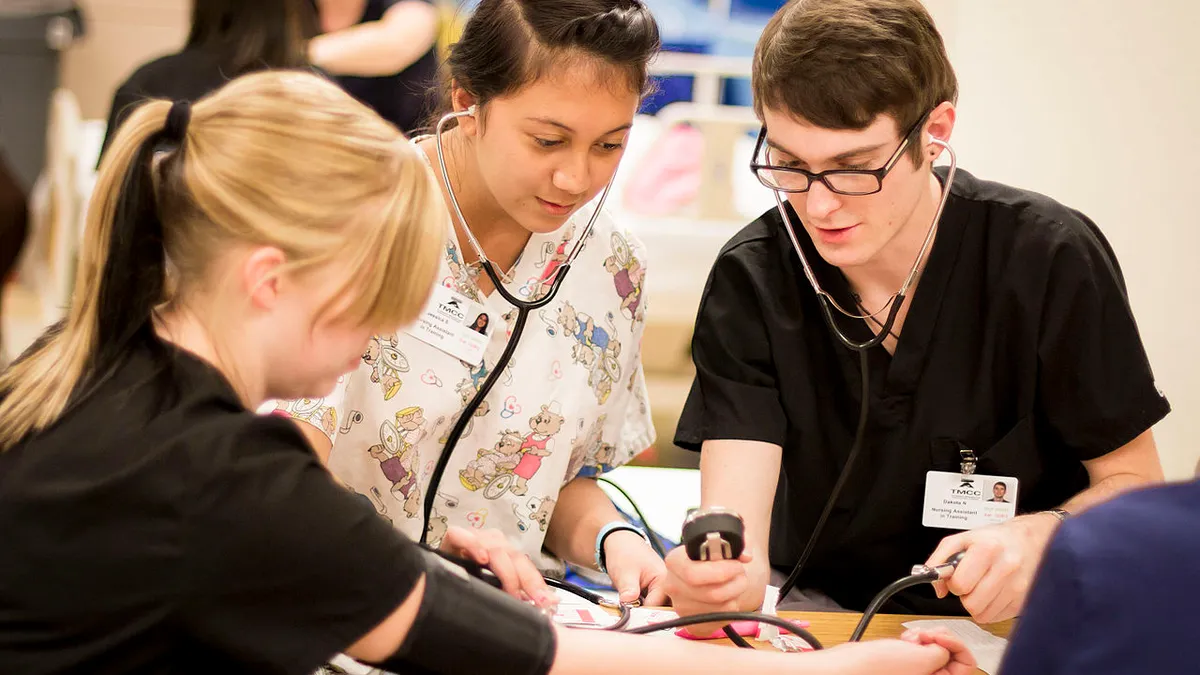Dive Brief:
- The U.S. Department of Labor is granting $183.8 million to colleges and their private-sector partners to support training for more than 85,000 apprentices in the health care, advanced manufacturing and information technology fields.
- Twenty-three higher education institutions and groups — including the Alabama Community College System, Purdue University and the Colorado Department of Higher Education — received funding. It will be partially matched by the private partners.
- The grant program stems from a 2017 executive order, in which President Donald Trump called on the federal government to expand apprenticeships.
Dive Insight:
The Trump administration sees apprenticeships as a way to help fill open jobs, which outnumber the count of unemployed workers. The three fields selected for the apprenticeships all face steep worker shortfalls.
The U.S. manufacturing industry could have up to 2.4 million unfilled jobs by 2028 due to the retirement of baby boomers and automation. The health care field will need to hire 2.3 million additional workers by 2025 to keep up with an aging population. And about two-thirds of surveyed technology leaders said labor shortages are harming the industry.
Apprenticeships can be an attractive way to fill those skills gaps. Employers view them as a way train and vet talent before hiring, while colleges see them as an opportunity for hands-on learning. And federal officials are hoping to grow the program in industries that don't have strong apprenticeship opportunities, such as tech and health care.
"(Apprenticeships) are just beginning to develop in all of these nontraditional fields," said Michael Netzer, executive dean of continuing education and online learning at the Community College of Baltimore County (CCBC), which was selected to receive one of the Labor Department's grants.
The college plans to use the money to launch one apprenticeship and two pre-apprenticeships in the health care field. It aims to have 624 students complete the programs over a four-year period.
"Health care is one of those industries (in which) the job demand is always high," said Steve Jurch, assistant dean of health and business services at CCBC. The college's planned apprenticeship program for medical assistants will benefit from a 26% bump in statewide job growth by 2026, he added.
Florida International University is hoping to use its roughly $2 million grant to train workers in another in-demand industry: cybersecurity. "There are hundreds of thousands of unfilled jobs across the nation in this area," said Bridgette Cram, the university's assistant vice president for academic and student affairs. "And there are actually not that many cybersecurity apprenticeships ... so there was this gap we were seeking to fill."
John Wensveen, vice provost of academic schools at Miami Dade College, told Education Dive in an email that it will use some of its $2 million in grant money to give employers stipends as an incentive to participate. Students can get stipends for books, supplies and industry certification exams.
Along with grant funding, the Labor Department also rolled out proposed regulations that would set up a new apprenticeship system to run alongside the current registered apprenticeship system. In addition, the department wants to allow certain groups, including educational institutions, to set the standards and structure for such a program.















